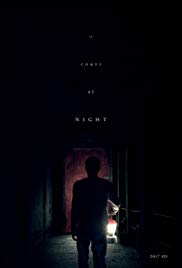
IT COMES AT NIGHT
US, 2017, 91 minutes, Colour.
Joel Edgerton, Christopher Abbott, Carmen Ejogo, Riley Keough, Kelvin Harrison Jr, Griffin Robert Faulkner.
Directed by Trey Edward Shults.
Given some news from the United States where angry patrons have denounced and/or walked out of this film because they were waiting for “it� to arrive, a worthwhile comment is that this is a psychological drama, with some overtones of horror, not for the multiplex audience but more for arthouse audiences. This is nothing of a monster-fest but what might be called a serious imagining of the human condition in crisis circumstances.
Actually, it is a bit hard to work out what the title actually means. During the film and at the end we are asking ourselves what “it� actually is. While much of the film is at night, there is also a great deal of daylight.
Nevertheless, this is a very well acted film, a film with a great deal of atmosphere, a great deal of tension. Something drastic has occurred in major North American cities, making people flee from the cities, making them live in isolation in the woods, water and food is scarce, no electricity or communications. The drama at the opening of the film consists of a man, obviously highly infected with some mysterious disease, his relatives wearing gas masks, acknowledging his death, burying and burning him.
Within the house, the family, consisting of father, Paul, Joel Edgerton, his wife Sarah, Carmen Ejogo, and their 17-year-old son Travis, Kenneth Harrison Jr, can take off their masks, sit rather solemnly, wondering what is going to happen and how they will cope. Suddenly, there is a banging at the door, someone trying to get in and they treat him with utmost suspicion.
With this atmosphere and mystery, and with the man identifying himself, looking for refuge for himself and his wife and son, the film shifts into a movement away from paranoia (and one reviewer did make the remark that the film was about post-apocalyptic paranoia – was this the “it�?) and an attempt for the families to live together.
Joel Edgerton is a former history teacher taking on patriarchal responsibilities (and he and his wife are in a mixed race marriage). The other interesting character is the son, Travis, who experiences strange dreams, probably some premonitions about what might come.
As indicated by the angry responses of American horror and monster fans, the film leaves us with the mystery, the paranoia, the suspicions, the violence, and the uncertainty of how to survive in a world turned extraordinarily mysterious.
1. The title, meaning? Tone? Mystery?
2. Post-apocalyptic story? The prevalence of disease, the havoc in the cities, deaths? Issues of survival, in the woods? Families? The loss of power and communications?
3. The woods, the trees and the paths, the house, exteriors and interiors, the burial place, the car and travel? The musical score?
4. The tone, the initial illness, the man and his disfigurement, dying, the family wearing masks, the tarpaulin, the grave, shooting the man, burying and burning?
5. Paul, Sarah, their marriage, Travis as their son? The family unit and strong bonds? Stanley, the companion dog?
6. The house, past, the range of rooms, the several storeys, the corridors with the photos, the locked doors, the red door?
7. Paul, serious, the situation, in charge, father, the touch of the patriarch? Love for Sarah? Care for Travis? His being a history teacher? Travis, his age, respecting and obeying his parents, his room, love the Stanley, his dreams?
8. William, at the door, trying to get in, Paul attacking him, taking him prisoner, the fears about disease, stripping him, tied to the tree, his head covered? His cries on the night? Paul releasing him, listening to his story, the family, his brother-in-law, his family living in the woods, needing water? The decision to go on the trip, the drive, William keeping guard, the sudden shooting, the crash, the assailants, no explanation, their deaths? The grave?
9. William and his family, the decision about the families living together, setting down the rules, collaboration, water, food, the chickens and the goats? The way of life, peaceable? William, his wife, the intimacy, their son and his age? Travis listening into them?
10. Progress, collaboration, Travis and chopping the wood, the various jobs, friendships, the chat with William’s wife in the kitchen at night?
11. Stanley, running away, Travis chasing, the fate of the dog, Travis not allowed to see him, his being shot, buried?
12. Travis, carrying Andrew to his room, his testimony about the door?
13. The meeting, the decision to live separately, listening in, the family’s decision to leave, packing?
14. The attempt to leave, the pulling of guns? The masks? Going out, confrontations, William shot, the boy killed, Paul shooting his mother? The consequences?
15. Travis, his dreams, William’s wife and the blood, seeing the old man dying, his own fate? Premonitions?
16. Paul and Sarah sitting at the table, Travis by himself – and the audience contemplating what had happened and its meaning?